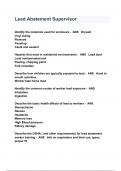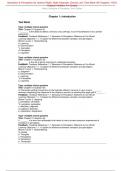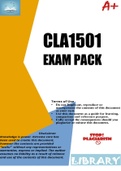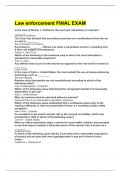Page 1 of 44
, Chapter 1: Basic Concepts of Child and Adolescents Development
1.2 The Goals of Child Psychology
• Child psychology is an interesting area as is that it tells you more about your own and your
children's development.
• In the process, you also acquire a better understanding of other people
• As a scientific discipline child psychology has four key goals in line with psychology as a general
discipline
• The goals of child psychology are:
1. To describe
2. To explain
3. To predict
4. To improve well being
To describe
• To describe how changes typically occur from conception to +/- 18 years of age
1. E.g: How does the unborn child develop in his or her mother's womb?
To explain
• To explain what causes these developmental changes
1. E.g: Which factors could influence the prenatal development of the baby or could
influence a delay in a child's language or cognitive development?
To predict
• To predict based on past and present characteristics what behaviour child will manifest at a
later stage of life
1. E.g: What would the effect of alcohol and smoking on the unborn child?
To improve well being
• To improve well-being is to make positive changes in people's lives or to prevent problems
from developing.
5. E.g: making pregnant women aware of environmental factors that could harm their unborn
children, informing teachers about the negative effect of bullying, or educating parents
about the possible effect of harsh corporal punishment.
• When thinking of child psychology and how child development is studied, development can be
conceptualised into different stages
1.4 Developmental Stages
• Development of the child is a continuous process, it is useful to divide it into stages, using
characteristics and skills
• The stage approach provides a good indication of when children are school ready, or ready to
make their own decisions on important matters
• It also allows us to get an understanding of when development is below or above the
average/norm (indicators – important)
• Some boundaries are more clearly demarcated than others
• It is important that we take individual and cultural differences into account, as they play a
role in development
• Developmental stages can be divided into 5 primary stages
• Developmental stages:
1. Prenatal stage (subdivided into germinal, embryonic, and fetal stages)
Page 2 of 44
, 2. Neonatal stage (first 2 to 4 weeks of life) and infancy (subsequent two years)
(usually grouped together)
3. Early childhood (+/- 2-6 years)
4. Middle childhood (+/- 6 years to beginning of puberty, about 12 years)
5. Adolescence (from puberty to adulthood)
• It is important when considering these developmental stages, in how they are sectioned and
the different age groups being looked at, to consider the legal definition of a child
• Legal definition differs from child to child, in South Africa a child is defined as anybody up
until 18
• Humans are complex and many-faceted beings, and different characteristics develop in
• different ways, at different tempos and at different stages of their lives.
• So, when discussing developmental stages, it is also important to think about the different
domains of development
• It is also necessary to distinguish between the various areas of development and to study
them separately, without losing sight of the whole
• Developmental domains are as follows:
1. Physical development
2. Cognitive development
3. Personality development
4. Social development
1. Physical development
• Physical changes in the child’s body (e.g. weight, height, brain development)
• Also, the development in the brain; effect of factors like hormones, nutrition, and other
hereditary characteristics
• An important aspect = motor development (refers to body movement)
• Child development and the motor skills refers to things like crawling and walking
Cognitive development
• Refers to how children come to know and understand Cognition: how we acquire
their world information about the world
• It includes knowing and understanding includes through our senses, process and
perception, learning, memory, thinking, decision making, interpret it, then store and
imagination, creativity, language, intelligence retrieve this knowledge to
• Intelligence is not the same thing as cognition, rather it is direct
a subdivision
our behaviour
• These are all factors to be discussed when looking at different developmental stages (how
children’s cognition differs and develops as they age)
Personality development
• The most agreed upon definition is that personality refers to the totality of a person’s
psychological, social, moral, physical characteristics
• Remember personality is unique to each individual
• Personality development includes discussions of the self, the self-concept and identity
The self: Core of a person’s personality
Self-concept: Person’s evaluation of themself
Identity: The way a person identifies themself
in relation to other individuals or social groups
Social development
• Involves the development of the individual’s interaction and relationships with other people
Page 3 of 44
, •It also refers to the influence of society and significant others on individual is important to
social development
• Significant others refer to individuals that play an important role in someone’s life
• Key components in child social development that must be looked at are:
o The attachment between a child and the main caregiver
o The interpersonal relationships a child develops and how they expand
o Understanding the modelling of behaviour
• Social development should not be confused with socialisation
• Important aspects of social development include:
o Socialisation (an aspect of social development where the individual acquires socially
acceptable behaviour through social interaction with)
o Moral development (includes the individuals views concerning what is right and wrong
and development in how moral judgements are made)
o Religion and spirituality (usually learned in social contexts, whether through
instructions by parent, community or religious leaders)
• Although developmental areas are mentions separately they are interrelated and operate in
interaction with one another; every individual functions as a whole
1.5.1. Developmental Issues
• There are always various viewpoints and opinions on various issues
• Within child psychology there are also various issues that are contentiously debated
• The four that are important to child development are:
1. Nature nurture
2. Continuity or discontinuity
3. Passive or active involvement
4. Universality or cultural context
Nature (environment) or Nurture (genetic/biological)
• Nature refers to biological determinants such as genetic, neurological, and hormonal factors
• Nurture refers to environmental factors such as the social (e.g. parenting styles) and physical
environment (e.g. poverty)
• Central question: Whether child’s development is the result of biological and genetic factors
(nature) or environmental influences (nurture)
• Reasons why thus debate has continued so long are as follows:
1. The debate is heavily interwoven with arguments that are not strictly scientific so
political and religious beliefs colour arguments with emotion trumping scientific data
e.g. political and religious leaders support that nurture (environment) causes
homosexuality; sexual orientation is a choice, modern scientists acknowledge that
biological factors play a more important role in homosexuality than was previously
accepted
2. A wide variety of behaviour is encompassed so it is relatively easy to find an
example that will support the either viewpoint
e.g. motor development may be an example that behaviour is genetically determined,
while socialisation may be used as evidence that behaviour is a product of behaviour
3. Cause of a specific behaviour is often very difficult to prove because behaviour is so
multifaced
e.g. if a child who was traumatised develops depression, how could one prove that
the depression was caused by the trauma or that it would not have developed
anyway (i.e. due to genetic reasons)
• The cause-effect issue has fed into the nature vs nurture debate very clearly
• Overtime, the focus of debate no longer centres on which one is more important, but rather
on how each of these factors contribute to specific behaviours, situations, and individuals
Page 4 of 44
, Chapter 1: Basic Concepts of Child and Adolescents Development
1.2 The Goals of Child Psychology
• Child psychology is an interesting area as is that it tells you more about your own and your
children's development.
• In the process, you also acquire a better understanding of other people
• As a scientific discipline child psychology has four key goals in line with psychology as a general
discipline
• The goals of child psychology are:
1. To describe
2. To explain
3. To predict
4. To improve well being
To describe
• To describe how changes typically occur from conception to +/- 18 years of age
1. E.g: How does the unborn child develop in his or her mother's womb?
To explain
• To explain what causes these developmental changes
1. E.g: Which factors could influence the prenatal development of the baby or could
influence a delay in a child's language or cognitive development?
To predict
• To predict based on past and present characteristics what behaviour child will manifest at a
later stage of life
1. E.g: What would the effect of alcohol and smoking on the unborn child?
To improve well being
• To improve well-being is to make positive changes in people's lives or to prevent problems
from developing.
5. E.g: making pregnant women aware of environmental factors that could harm their unborn
children, informing teachers about the negative effect of bullying, or educating parents
about the possible effect of harsh corporal punishment.
• When thinking of child psychology and how child development is studied, development can be
conceptualised into different stages
1.4 Developmental Stages
• Development of the child is a continuous process, it is useful to divide it into stages, using
characteristics and skills
• The stage approach provides a good indication of when children are school ready, or ready to
make their own decisions on important matters
• It also allows us to get an understanding of when development is below or above the
average/norm (indicators – important)
• Some boundaries are more clearly demarcated than others
• It is important that we take individual and cultural differences into account, as they play a
role in development
• Developmental stages can be divided into 5 primary stages
• Developmental stages:
1. Prenatal stage (subdivided into germinal, embryonic, and fetal stages)
Page 2 of 44
, 2. Neonatal stage (first 2 to 4 weeks of life) and infancy (subsequent two years)
(usually grouped together)
3. Early childhood (+/- 2-6 years)
4. Middle childhood (+/- 6 years to beginning of puberty, about 12 years)
5. Adolescence (from puberty to adulthood)
• It is important when considering these developmental stages, in how they are sectioned and
the different age groups being looked at, to consider the legal definition of a child
• Legal definition differs from child to child, in South Africa a child is defined as anybody up
until 18
• Humans are complex and many-faceted beings, and different characteristics develop in
• different ways, at different tempos and at different stages of their lives.
• So, when discussing developmental stages, it is also important to think about the different
domains of development
• It is also necessary to distinguish between the various areas of development and to study
them separately, without losing sight of the whole
• Developmental domains are as follows:
1. Physical development
2. Cognitive development
3. Personality development
4. Social development
1. Physical development
• Physical changes in the child’s body (e.g. weight, height, brain development)
• Also, the development in the brain; effect of factors like hormones, nutrition, and other
hereditary characteristics
• An important aspect = motor development (refers to body movement)
• Child development and the motor skills refers to things like crawling and walking
Cognitive development
• Refers to how children come to know and understand Cognition: how we acquire
their world information about the world
• It includes knowing and understanding includes through our senses, process and
perception, learning, memory, thinking, decision making, interpret it, then store and
imagination, creativity, language, intelligence retrieve this knowledge to
• Intelligence is not the same thing as cognition, rather it is direct
a subdivision
our behaviour
• These are all factors to be discussed when looking at different developmental stages (how
children’s cognition differs and develops as they age)
Personality development
• The most agreed upon definition is that personality refers to the totality of a person’s
psychological, social, moral, physical characteristics
• Remember personality is unique to each individual
• Personality development includes discussions of the self, the self-concept and identity
The self: Core of a person’s personality
Self-concept: Person’s evaluation of themself
Identity: The way a person identifies themself
in relation to other individuals or social groups
Social development
• Involves the development of the individual’s interaction and relationships with other people
Page 3 of 44
, •It also refers to the influence of society and significant others on individual is important to
social development
• Significant others refer to individuals that play an important role in someone’s life
• Key components in child social development that must be looked at are:
o The attachment between a child and the main caregiver
o The interpersonal relationships a child develops and how they expand
o Understanding the modelling of behaviour
• Social development should not be confused with socialisation
• Important aspects of social development include:
o Socialisation (an aspect of social development where the individual acquires socially
acceptable behaviour through social interaction with)
o Moral development (includes the individuals views concerning what is right and wrong
and development in how moral judgements are made)
o Religion and spirituality (usually learned in social contexts, whether through
instructions by parent, community or religious leaders)
• Although developmental areas are mentions separately they are interrelated and operate in
interaction with one another; every individual functions as a whole
1.5.1. Developmental Issues
• There are always various viewpoints and opinions on various issues
• Within child psychology there are also various issues that are contentiously debated
• The four that are important to child development are:
1. Nature nurture
2. Continuity or discontinuity
3. Passive or active involvement
4. Universality or cultural context
Nature (environment) or Nurture (genetic/biological)
• Nature refers to biological determinants such as genetic, neurological, and hormonal factors
• Nurture refers to environmental factors such as the social (e.g. parenting styles) and physical
environment (e.g. poverty)
• Central question: Whether child’s development is the result of biological and genetic factors
(nature) or environmental influences (nurture)
• Reasons why thus debate has continued so long are as follows:
1. The debate is heavily interwoven with arguments that are not strictly scientific so
political and religious beliefs colour arguments with emotion trumping scientific data
e.g. political and religious leaders support that nurture (environment) causes
homosexuality; sexual orientation is a choice, modern scientists acknowledge that
biological factors play a more important role in homosexuality than was previously
accepted
2. A wide variety of behaviour is encompassed so it is relatively easy to find an
example that will support the either viewpoint
e.g. motor development may be an example that behaviour is genetically determined,
while socialisation may be used as evidence that behaviour is a product of behaviour
3. Cause of a specific behaviour is often very difficult to prove because behaviour is so
multifaced
e.g. if a child who was traumatised develops depression, how could one prove that
the depression was caused by the trauma or that it would not have developed
anyway (i.e. due to genetic reasons)
• The cause-effect issue has fed into the nature vs nurture debate very clearly
• Overtime, the focus of debate no longer centres on which one is more important, but rather
on how each of these factors contribute to specific behaviours, situations, and individuals
Page 4 of 44






















